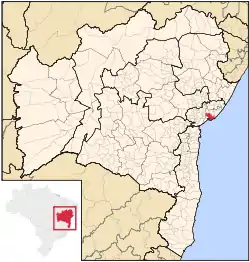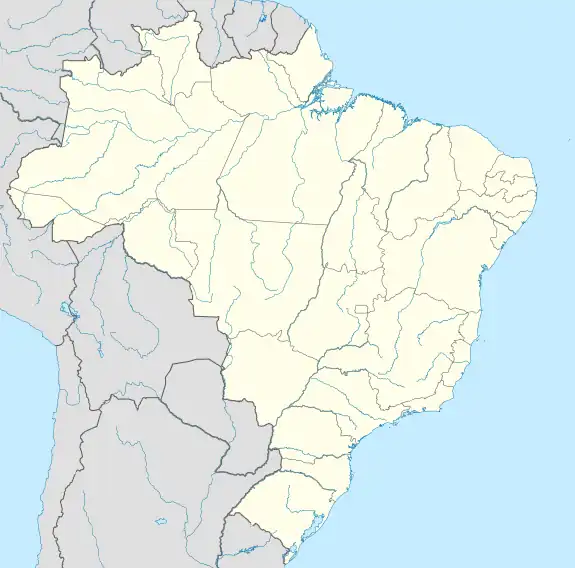Salvador, Bahia
Salvador is a Brazilian city, capital of the state of Bahia. It has about 2.7 million inhabitants and an area of 709 square kilometres (274 sq mi).
Salvador | |
|---|---|
Municipality | |
| O Municipio do São Salvador da Bahia de Todos os Santos The Municipality of Saint Savior of the Bay of all Saints | |
 Flag  Seal | |
| Nickname(s): Capital da Alegria (Capital of happiness), Roma Negra (Black Rome) and Bahia Judia (Jewish Bay). | |
| Motto: Sic illa ad arcam reversa est (And thus the dove returned to the ark) | |
 Location of Salvador in the State of Bahia | |
 Salvador Location in Brazil | |
| Coordinates: 12°58′29″S 38°28′36″W | |
| Country | Brazil |
| Region | Northeast |
| State | Bahia |
| Founded | March 29, 1549 |
| Government | |
| • Mayor | João Henrique Carneiro (PMDB) |
| Area | |
| • Municipality | 706 km2 (273 sq mi) |
| Elevation | 8 m (26 ft) |
| Population (2010) | |
| • Municipality | 2,676,606 (3rd) |
| • Density | 10,176.6/km2 (26,357/sq mi) |
| • Metro | 3,574,804 (7th)[1] |
| Time zone | UTC-3 |
| Postal Code | 40000-000 |
| Area code | +55 71 |
| Website | Salvador, Bahia |
In 2010, the city of Salvador had the 3rd most people in Brazil, after São Paulo and Rio de Janeiro.[2]
Salvador is the second most popular tourism destination in Brazil, after Rio de Janeiro.[3] Among the points of interest are its famous Pelourinho (named after the colonial pillories that once stood there) district, its historic churches,[4] and its beaches.
In 1985 the Historic Centre of Salvador was made a World Heritage Site by UNESCO.
According to the Guinness Book of Records, the carnival or Carnaval of Salvador da Bahia is the biggest party on the planet. For an entire week, almost 4 million people celebrate throughout 25 kilometers (16 mi) of streets, avenues and squares. It takes about 100 thousand people to organize the event.[5] Salvador has about 800 thousand visitors for this event.
The first books that arrived in Salvador were brought by the Jesuits.[6] The first libraries or bookstores that appeared were under the control of the religious missionaries. They mostly had books on religion.
Sports
Salvador has many sport activities. The Fonte Nova Stadium, also known as Estádio Octávio Mangabeira is a football stadium started on January 28, 1951. It can hold 66,080 people. The stadium is owned by the Bahia government, and is the home ground of Esporte Clube Bahia. Its formal name honors Octávio Cavalcanti Mangabeira, a civil engineer, journalist, and former Bahia state governor from 1947 to 1954. The stadium is nicknamed Fonte Nova, because it is at Ladeira das Fontes das Pedras. The stadium was closed in 2007 due to an accident. The E.C. Bahia home matches now happen in another stadium, in Pituaçu.
Esporte Clube Bahia and Esporte Clube Vitória are Salvador's main football teams. Bahia has won 2 national titles, Brazil Trophy in 1959 and the Brazilian League in 1988. Vitória was a runner up in the Brazilian league in 1993 and Brazil Cup in 2010.
Salvador has two large green areas for the practice of golf. Cajazeiras Golf and Country Club has a 18-hole course. Itapuã Golf Club has a 9-hole course. Tennis is very popular among Salvador's elites. Brasil Open, the country’s most important tournament, happens every year in Bahia.
During the last decades, volleyball has grown steadily in Salvador. It became popular after the gold medal won by Brazil in the 1992 Summer Olympics in Barcelona. The most important tournaments in Bahia are the State Championship, the State League tournament and the Primavera Games. There are also beach volleyball events. Salvador has had many international tournaments. Bowling is practiced both by teenagers and adults in Salvador.
Bahia's basketball league has competed since 1993. They have 57 teams. The sport is very popular in the city of Salvador, especially among students.[7]
Todos os Santos Bay and Salvador's climatic conditions are ideal for competition and recreational sailing. Salvador has a national racing schedule with dozens of events, also receiving the Mini Transat 6.50 and Les Illes du Soleil races.
Rowing boat races started in the city more than a hundred years ago. It was first practiced by young men from traditional families, who spent their summer vacations there. With the recent fixing of the Dique do Tororó area, Salvador received new lanes for the practice of the sport.
References
- "IBGE | Portal do IBGE | IBGE".
- The largest Brazilian cities - 2010 IBGE Census (in Portuguese)
- "Salvador, Praias e Noite". Archived from the original on 2014-02-01. Retrieved 2012-08-06.
- "Historic Churches in Pelourinho". Retrieved 2010-04-17.
- "Carnaval of Salvador". Home.centraldocarnaval.com.br. Archived from the original on 2010-04-30. Retrieved 2010-04-17.
- "Tomé de Souza in Salvador". Muse.jhu.edu. Retrieved 2010-04-17.
- "Basketball in Salvador". Asbacsalvador.com.br. Retrieved 2010-04-17.